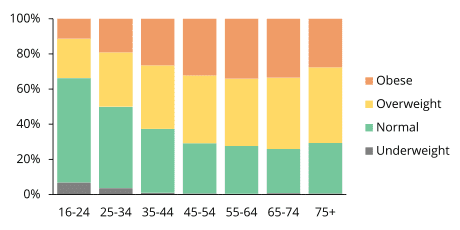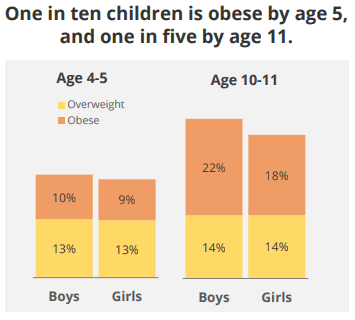How much does obesity increase health risks?
Obesity is usually defined as having a body mass index (BMI) of 30 or above, a BMI of between 25 and 30 is classified as ‘overweight’.


Parliamentary research by Health Survey for England has found that 35% of adults are overweight with a further 26% obese.
Men are more likely than women to be overweight or obese (66% of men, 57% of women). Levels of overweight and obesity are highest among those aged 45-74, as the table below shows.

Childhood Obesity
As with adult obesity levels; those of children have been rising at an alarming rate across the UK over the past 20 years. Attitudes to weight have been questioned across the health industry as the nation continues to excersise less and consume increasing amounts of fatty/high sugar foods.

- 9.6% of reception age children (age 4-5) are obese, with a further 13.0% overweight.
- At age 10-11 (year 6), 20.0% are obese
- 14.3% overweight.
The impact on health
We know that obesity levels are high but what does that mean for our health?
New research has confirmed that those with a BMI of between 30 and 35 are 70% more likely to develop heart failure than those with normal BMI levels. This is according to a report presented at the European Congress on Obesity (ECO) in Scotland.
Those with a BMI of 30-35 also showed an increased risk of diabetes, nine times more likely than those with a healthy BMI. But it is not just those with very high BMI levels. A recent study showed that even those that are slightly overweight, are twice as likely to develop type-2 diabetes.
People in the 40-45 BMI bracket were 12 times more likely to develop type-2 diabetes. They are also a worrying 22 times more likely to also develop sleep apnoea, and are at triple the risk of developing heat failure, and 50% more likely to die prematurely from health-related problems.
Health Risks of Obesity
Unfortunately obesity increases the risk of many health conditions, including:
- Joint problems
- Lower back issues
- High blood pressure
- Heart disease and stroke
- DVT
- Type 2 diabetes
- Endometrial, breast and colon cancer
- Stress incontinence
- Menstrual abnormalities
- Erectile dysfunction
- Respiratory problems
The increase in obesity across many parts of the world has been well documented, with the number of people suffering from obesity tripling in just the last 30 years. Experts are concerned that these findings show that obesity is having a serious impact on public health.


